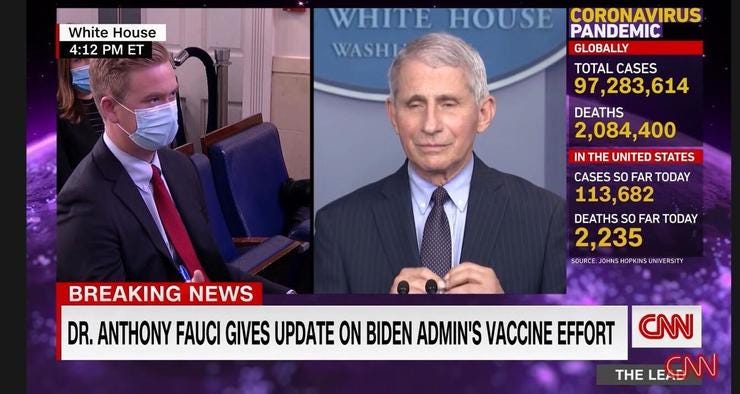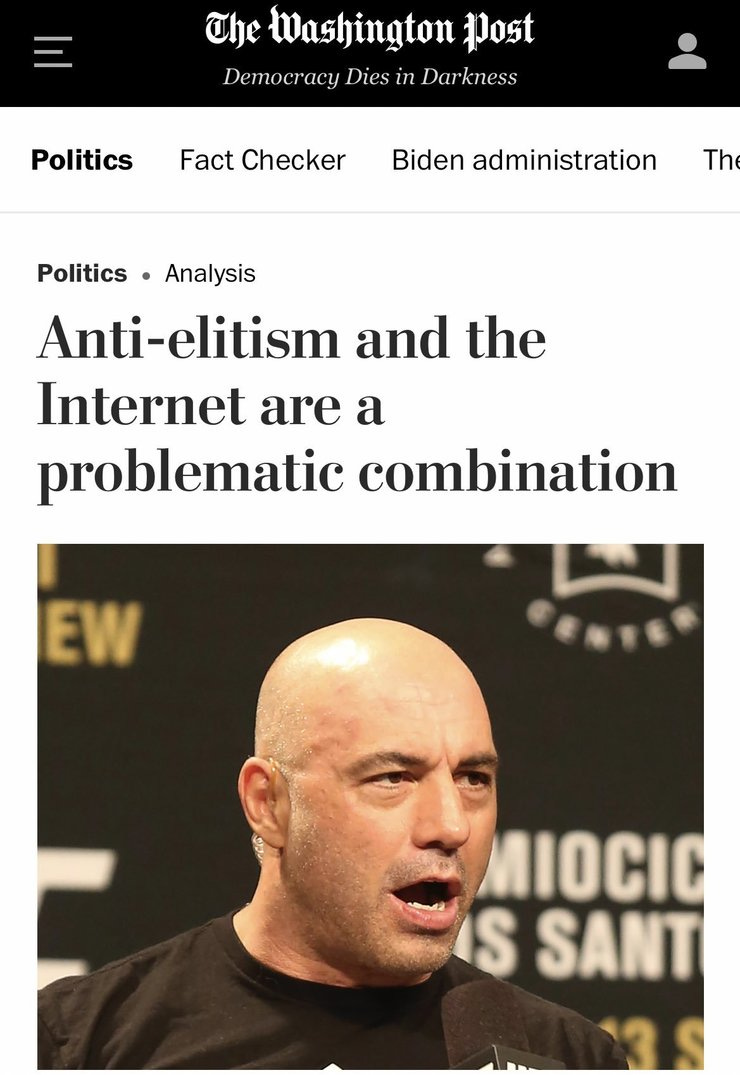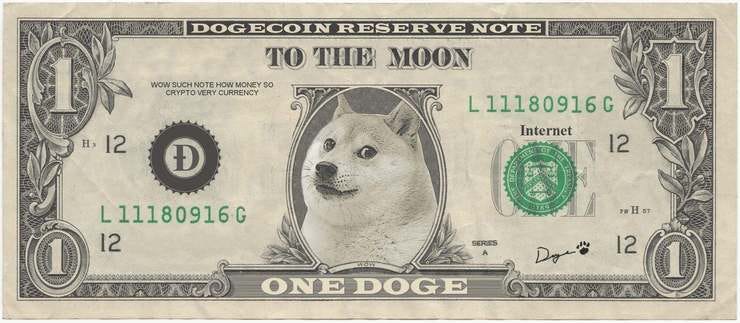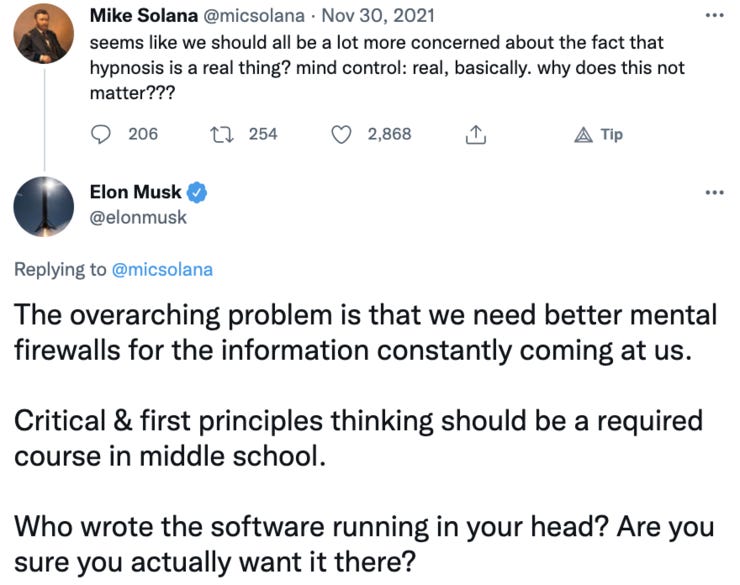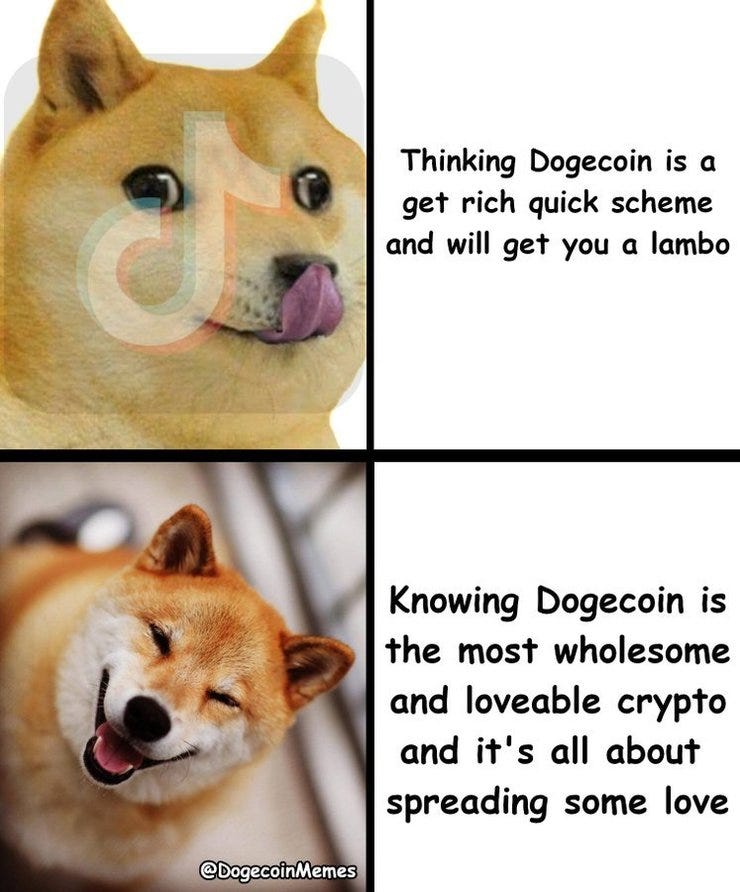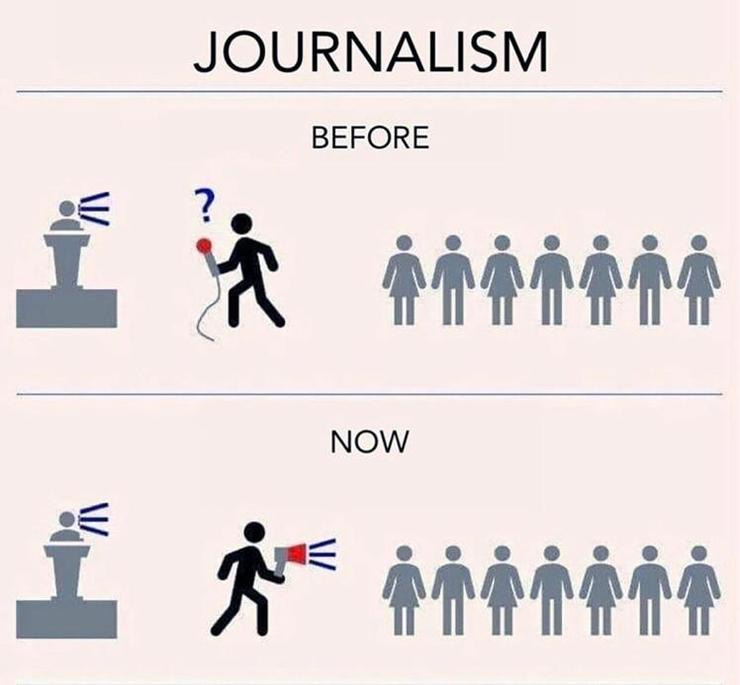Can Crypto Fix The Media?
Hey everyone,
Mainstream media is broken.
A recent survey found that nearly half of 35,000 respondents thought journalists are no longer a trustworthy source of information.
While old media is faltering, a new brand of internet journalism is on the rise, leveraging memes and blockchain to create authentic connections with audiences.
Let’s take a look at the shifting media landscape, and how Dogecoin can play a part.
Mainstream Hatestream
Elon has a long history of being mistreated by the press.
Last week, he sparked a discussion about negativity in traditional media:
Voices from all corners of Twitter flocked to weigh in.
Distrust in mainstream narratives is on the rise, buoyed by the perception that big outlets put the interests of government and corporate advertisers ahead of the Truth.
While old media is losing momentum, a new group of independent journalists is finding its feet.
Creators like Glenn Greenwald, Joe Rogan, Russell Brand, Sagaar and Krystal, the IDW, the Pomp brothers, and others are building an alternative media ecosystem. Anti-censorship platforms like Substack and Rumble are popping up to support them.
Faced with growing competition, traditional media has doubled down on divisiveness by pigeonholing mainstream dissenters as extremists.
The conflict reared its head this past week over a context-free video of Joe Rogan using racially charged language. Rogan apologized for the video and agreed to have 70 episodes removed from Spotify.
While traditional outlets fanned the flames of controversy, JRE supporters stood their ground against cancel culture. Spotify's CEO ultimately chose to keep Rogan on the platform.
These kind of skirmishes will only intensify as new media further erodes legacy media's market share.
One thing is certain: the media landscape is volatile, and getting more so with each passing week.
At times, it can feel like the world is splitting into two.
Let's slow things down and try to figure out what's really going on.
Negativity Bias
Independent online journalism represents an existential threat to traditional media.
To stay afloat, traditional media resorts to a handful of survival strategies that create short bursts of engagement but erode trust over the long haul.
Traditional media's worst habit has been to capitalize on disaster to drive viewership.
When no disaster exists, it exaggerates how bad things are or invents a calamity whole cloth.
As a result of this faustian bargain, traditional media suffers from pervasive negativity bias, causing it to depict the world as worse than it actually is.

This bias creates self-reinforcing cycles of pessimism and conflict: as viewers internalize the idea that the world is a helplessly bad place, their actions are more likely to reflect that expectation.
Here are a few examples of how legacy media lowers the collective vibe:
presenting the country as more divided than it actually is
repeatedly revising the official pandemic narrative without holding itself or institutional power accountable for past errors
gaslighting dissenters of the mainstream
advocating for censorship rather than dialogue as an appropriate response to opinions that fall outside mainstream purview
decrying the erosion of privacy while simultaneously harvesting and selling readers' personal data
reflexively taking the side of elites over regular people
warmongering on behalf of the defense industry, like Iraq in the early 2000s or Ukraine in the present
As legacy bleeds viewers, examples of media-driven fear and division will only grow more absurd.
It has become a form of online sport to collect mainstream headlines that project over-the-top negativity onto their audience.
The meme "clown world" has become shorthand to signify this brand of manipulation.
There are a handful of reasons journalism has sunk so low.
Legacy media suffers from same hyper-concentration of power as the financial system.
A small number of giant corporations control 90% of outlets, allowing for an unprecedented level of narrative discipline.
Some of the world's most profitable companies are also media's biggest ad buyers, muddying the waters of truth.
A third issue is format: TV news and print journalism are restricted by time and space, incentivizing surface outrage over depth and nuance.
If all this weren't enough, mainstream media finds itself embroiled in an improbable string of sex scandals. In an interview with the Babylon Bee, Elon roasted CNN for its employees' behavior, saying he's "not perverted enough" to appear on the network.
As the legacy media stumbles, a new form of internet-native journalism has taken the wheel, driving public dialogue in new directions.
Unsurprisingly, old media has found cause for alarm in this too, attacking its independent competitors as disinfo-peddlers amid much hand-wringing about the decline of "real journalism."
Is the media actually dying, or are we transitioning into a new golden age of information?
Crypto-powered journalism
Just as new media threatens legacy media, crypto poses an existential risk to legacy finance.
Given that banks are frequent newspaper ad-buyers, it's not surprising that legacy media casts a skeptical eye toward crypto.
In the last year, however, the tide has turned. A growing crypto political bloc is throwing its weight around in US and world politics.
With the movement gaining steam, crypto is putting legacy media on notice.
Last week, in an instantly viral clip, NFT guru Gary Vee demolished an attempt by a CNBC anchor to link crypto to white supremacy.
On the same day, news broke that crypto exchange Binance had purchased a stake in the legacy outlet Forbes.
One of the fakest legacy narratives about crypto is that Bitcoin is bad for the environment. Lately, there've been signs that this narrative is crumbling too.
Crypto's biggest advantage in the battle to control the narrative is its meme literacy: memes are the preferred way for crypto folk to transmit information.
Memes are ideal for combatting media propaganda because they are anti-ideological. A single powerful meme can take deflate years of indoctrination.

In contrast to party politics, with memes there's no package deal where people are pressured to accept every plank of a political platform at once or risk being ostracized. Each meme can be weighed on its own terms in the privacy of one's mind.
Another benefit to memes is that they are created anonymously, allowing them to slip the trap of ad hominem attacks that legacy media relies on to shut down narrative-violators.
Detractors point out that memes sometimes contain false information and lack the journalistic fact-checking process of a newsroom.
For meme connoisseurs, this is part of the game: memes sharpen the blade of discernment, forcing the reader to rely on their own logic, intuition, and research to decide if something's true rather than falling back on the reputation of the news outlet.
Memes are the most efficient way to absorb a large amount of information in a short period of time. Artificial intelligence may even be capable of learning from memes.
At times, there's something quasi-mystical about memes, which sit at a three-way intersection of fact, speculation, and magic.
Memes document reality, but they can also create it. Meme devotees have spoken about the ability to meme a desired outcome into existence.
Of all cryptocurrencies, Dogecoin, which draws on the power of both memes and blockchain, may have the most to offer independent journalism.
The DogeArmy love of humor and Do Only Good Everyday ethos are natural counterweights to the pessimism of corporate media.
Most legacy journalists work for a salary (if they're lucky) or freelance—in either case, their payment comes from a single source.
Dogecoin culture emphasizes tipping and donations, which makes it a natural fit to crowd-fund independent journalism and other creative work.
This decentralized payment model allows journalists to bypass institutional filters, making their work more resilient to censorship because there's no single point to cut off funding
It also allows for a tighter feedback loop between content and compensation: quality work is more likely to be rewarded immediately by tippers than a boss who conducts an annual performance review.
Last November, DogeArmy member Mark Cuban proposed a model of journalism based on a DAO. If the idea takes off, Dogecoin could play a role.
In the bigger picture, the rise of digital money and independent journalism go hand in hand: both are a rejection of the tightly controlled status quo.
These are early and exciting days in the transformation of journalism.
Details are still being hashed out, but the combination of memes and cryptocurrency has the power to transform the fourth estate forever.
The Media Matrix
To a significant extent, our thoughts shape reality.
Traditional media's negativity bias is a threat to humanity, seeding our minds with negative expectations about the future.
Conversely, positive thoughts are more likely to generate positive real-world outcomes and improve conditions for life on Earth.
Emerging from two years of pandemic uncertainty, humanity is as a pivotal moment.
Old systems are collapsing. With so much change on the horizon, it is easy to catastrophize.
In reality, the decline of legacy institutions represents a golden opportunity to build a better world.
One way to replace a failing system is to build new systems on top of it and let it crumble beneath the weight of increased prosperity.
Crypto, and especially Dogecoin, could form the base layer for new forms of people-powered news media.
Exciting times ahead...
Dogey Treats: News Bites
Crypto appeared numerous times in Super Bowl ads. A Shiba Inu appeared in an eToro commercial. Coinbase leapt from #186 to #2 on the app store after its QR code ad. FTX likened crypto-haters to various historical luddites in an ad featuring Larry David.
Dogecoin was the answer to a question on Jeopardy.
Russian government has reached an agreement with the country's central bank to recognize crypto as a form of currency. Will Russia's embrace of crypto set off game-theoretical cascade of other nations adopting crypto?
As western nations mobilized troops in Eastern Europe and Trudeau threatened protestors with "more and more severe" consequences, Elon tweeted, "The duty of a leader is to serve their people, not for the people to serve them."
A Canadian newspaper reported the Freedom Convoy has received donations in Dogecoin.
Last Thursday, Elon gave an update on Starship, including a riveting 5-minute animated video depicting Starship landing on Mars.
SpaceX, with the help of billionaire Jared Isaacman, raised $243 million dollars for St. Jude's children's hospital. Isaacman is Mission Commander for the Polaris Program, which will culminate with the launch of Starship.
Joe Biden publicly said the word "Tesla" for the first time since he took office after a petition asking him to acknowledge the world's leading EV manufacturer reached over 58,000 signatures.
Charles Payne, a rare mainstream voice sympathetic to the Reddit apes, bought 50k worth of Bitcoin. Payne tweeted at ex-faux-Doge CEO greg about having him as a guest on Fox Business.
A geomagnetic storm knocked out 40 Starlink satellites.
Elon tweeted "True" in response to a tweet that Tesla would become "more of an AI company than a car company."
According to data from the Labor Department, consumer price inflation soared to 7.5% in January.
McDonald's filed trademarks for a virtual restaurant.
Does Bitcoin promote peace by moving warfare into the digital domain and making it non-lethal?
AMC CEO Adam Aron tweeted about the rising short interest against AMC stock, saying he hoped short-sellers were "wrong, wrong, wrong."
Uber's CEO said it will "absolutely" accept crypto.
The NFL has been lobbying the SEC since June about the possibility of integrating crypto into the league.
Memes of the Week

Thank You!
Thanks for reading! Consider sending a tip or Super Following on Twitter to help keep the newsletter going!
Doge: DHA5831Aoh2CVhBdX8rAv74kEGzqDg9BUx
It's ALL Risky!
Thank you, kind reader, for reading and subscribing to this newsletter. I really appreciate it!
If you haven’t already, please sign up to this email newsletter for more weekly articles like this one. Also, please share it with a friend or on twitter if you enjoyed this article.
What do you think? Can Dogecoin fix journalism? Let me know!
Remember, Dogecoin is risky. But then again, it’s all risky!
Follow me on twitter at @itsALLrisky
Email me at itsALLrisky@gmail.com
Send a Doge tip: DHA5831Aoh2CVhBdX8rAv74kEGzqDg9BUx
This article was written in collaboration with @CryptoDogDivine, give them a follow!
Don't forget to subscribe to this newsletter!
Disclaimer: This is not financial advice and I am not a financial advisor. The article above references an opinion for entertainment purposes only and it is not investment advice. Do your own research and consult with a licensed financial adviser before making any investment decision. Do not treat any opinion expressed in this newsletter as a specific inducement to make a particular investment. Content, news, research, tools, and securities symbols are for educational and illustrative purposes only and do not imply a recommendation or solicitation to buy or sell a particular security or cryptocurrency or to engage in any particular investment strategy. The information provided is not warranted as to completeness or accuracy and is subject to change without notice. The projections or other information regarding the likelihood of various investment outcomes are hypothetical in nature, are not guaranteed for accuracy or completeness, do not reflect actual investment results and are not guarantees of future results. All investments involve risk, losses may exceed the principal invested, and the past performance of a security, industry, sector, market, cryptocurrency, or financial product does not guarantee future results or returns. Dogecoin is a speculative and highly volatile asset susceptible to pump-and-dump schemes.
At the time of publication, Dogecoin is around $0.15 per coin.





